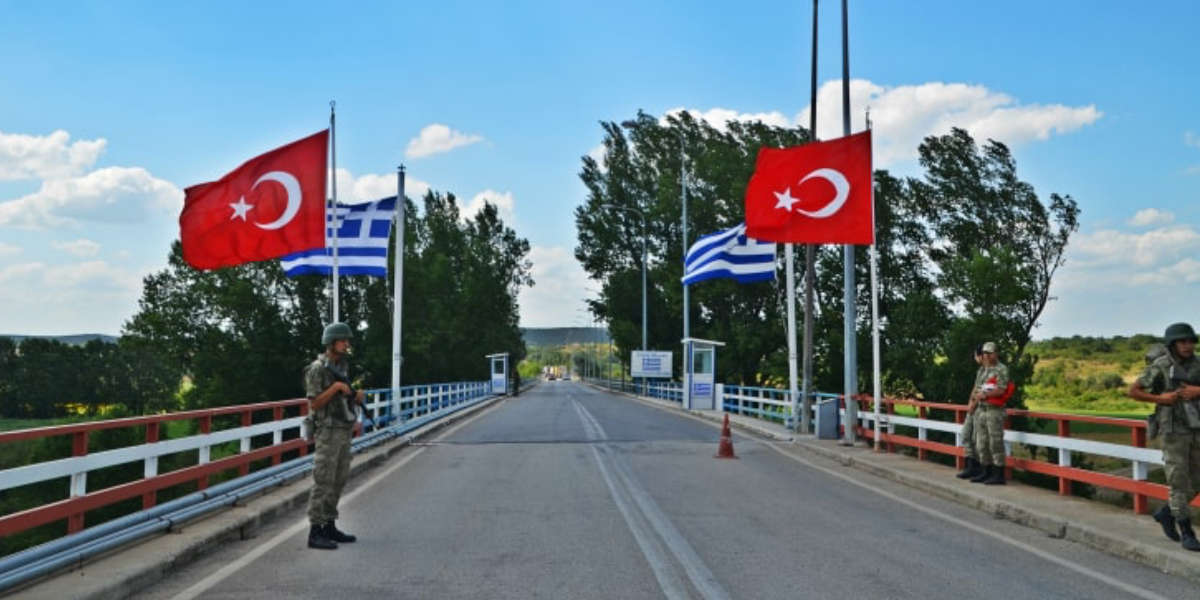In the picture
Border post on the border between Turkey and Greece, on the European mainland [Wikipedia].
The Aegean Sea is the scene of a long-running dispute that subjects relations between Greece and Turkey to continuous ups and downs whose effects are felt far beyond the region. Fortunately, so far the friction between the two countries has not escalated to the level of an armed confrontation. With the elections of mid-2023 behind them - with the re-election of Greek Prime Minister Kyriakos Mitsotakis and Turkish President Recep Tayyip Erdogan - Athens and Ankara have wanted to enter a moment of détente, but mutual sensitivities are once again finding occasions of discord that are hampering attempts at a deep and lasting rapprochement.
The reasons for tension between Greece and Turkey are based on the territorial distribution of a sea full of islands that complicate the delimitation of sovereignty. The dispute over islands very close to the Turkish coastline fester mutual relations, although, at the same time, this national adjacency has been a brake on maximalist headlong rush forwards due to the risk of a rapid escalation of war.
Turkey has denounced as illegitimate the militarization carried out by the Greeks of certain islands near Anatolia, granted to Greece by the treaties of Lausanne (1923) and Paris (1947) on condition that they remain demilitarized. However, Greece claims its right to do so on the grounds that the Montreux Convention (1936) had allowed Turkey to militarize the area of the Bosphorus and Dardanelles Straits. The Turks point out that the convention established a new regime for these straits, but did not modify the obligations to which Greece had subscribed in 1923.
These territorial disputes are also transferred to the flight areas, as well as to the maritime zones of economic exploitation, as in the case of hydrocarbon exploitation. Other aspects, such as migration, are equally sensitive.
Relations between the two countries have known various vicissitudes over the last few years, with an increase in dialectical confrontation as the elections called in Greece and Turkey in mid-2023 approached. However, the severe earthquake on Turkish soil in February 2024 opened a path of rapprochement due to Greek expressions of solidarity. The government in Athens ordered medical supplies and medicines, as well as blankets, beds and tents to be sent to the neighboring country. The Turkish area affected by the earthquakes, Adana, warmly received the Greek Foreign Minister, Nikos Dendias, while his Turkish counterpart, Mevut Cavusoglu, thanked Greece for its support.
This moment of friendship was followed by a new clash, this time over the tension around the islet of Zourafa, with different interpretations on the sovereign airspace and on the scope of the respective spanish pharmacy residency program (Flight Information Region). In October 2023, Turkey conducted a military exercise for which it issued a NOTAM (notice of mission statement air) to which Greece responded with a counter-NOTAM denouncing the infringement of its sovereignty, giving a status risk to the safety of air traffic over the Aegean.
Resuming their respective mandates, Mitsotakis and Erdogan met in Athens on December 7, 2023, at a meeting in which they expressed their commitment to good neighborliness and friendly cooperation. "We want to make the Aegean Sea a sea of peace and cooperation," said the Turkish president; "there is no problem between us that cannot be solved." Both leaders discussed the main reasons for friction in recent years between the two countries, over the continental shelf, the Cypriot conflict or overflights in the Aegean Sea.
The two leaders also discussed Syrian immigration caused by the civil war that has been raging in the Arab country since 2011, and decided to establish channels of communication to facilitate the sharing of information between the respective coast guards and police services. The Greek Prime Minister noted that the agreement reached between Turkey and the European Union, with systematic surveillance of sea and land borders, had led to a "substantial reduction in migration flows".
Although they maintained their disagreements on Cyprus, Mitsotakis and Erdogan's trade agreement agreement was signed to raise the exchange of products to 10 billion dollars.
But as much as Erdogan may have claimed at the time that "there is no problem" between the two countries that "cannot be solved", the fact is that friction has continued to occur. In March 2024, Athens expressed its disagreement with statements by the Turkish president in which he claimed that the entire island of Cyprus would be Turkish if Ancara's troops had continued to advance southward after occupying the Turkish zone in 1974. For its part, Turkey condemned the Greek decision to open two marine parks in the Aegean, announced unilaterally before a lecture on oceans held in Athens in April.
Erdogan and Mitsotakis again calmed the waters at a new quotation, held this time in Ankara on May 13. At the meeting they discussed territorial, trade, energy and cultural issues, at the framework of a "positivediary ". In the words of the Greek Prime Minister "We two neighbors can establish this rapprochement of mutual understanding, no longer as an exception but as a productive normality that is not cancelled out by the well-known differences we have".
The desire to enter into a period of détente is evident, but mutual sensitivities, resulting from territorial aspirations that the respective governments are unlikely to renounce, once again find occasions of discord that hinder attempts at a deep and lasting rapprochement.

